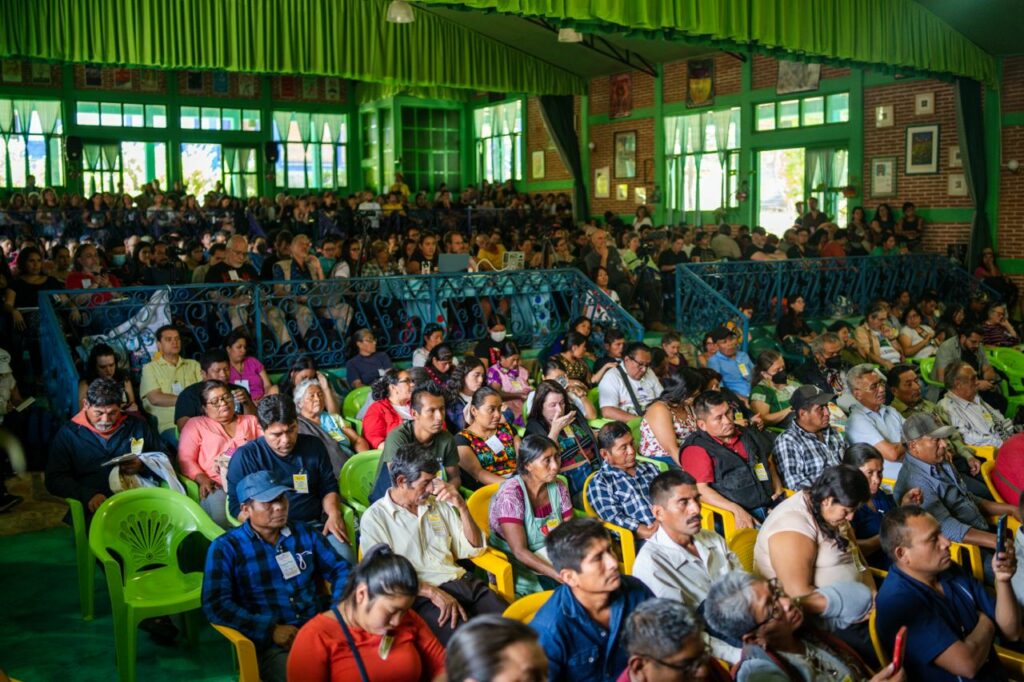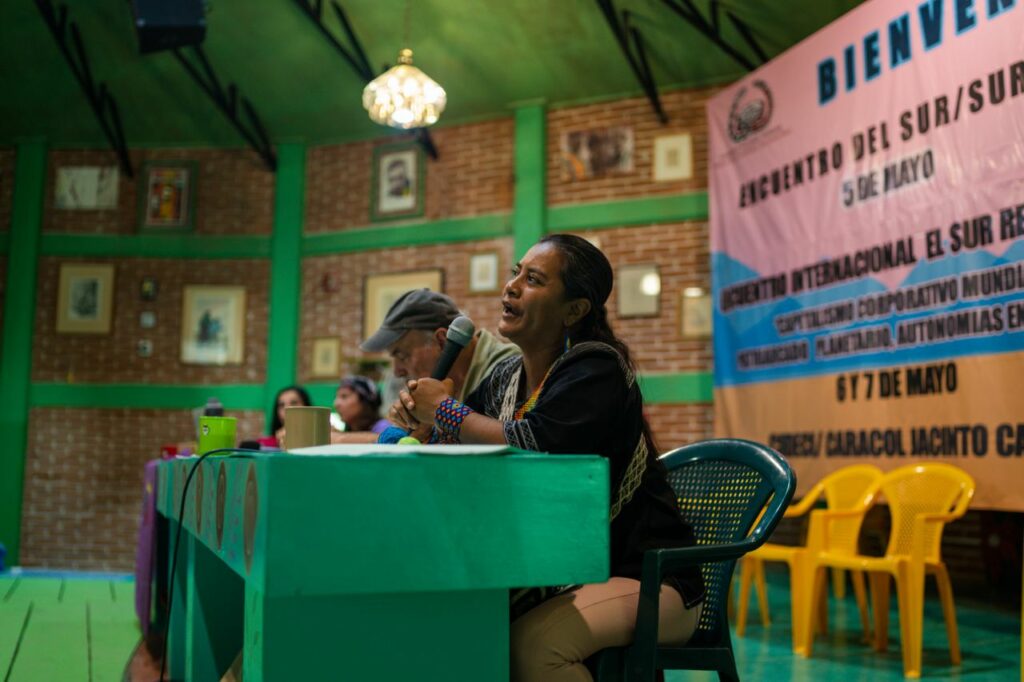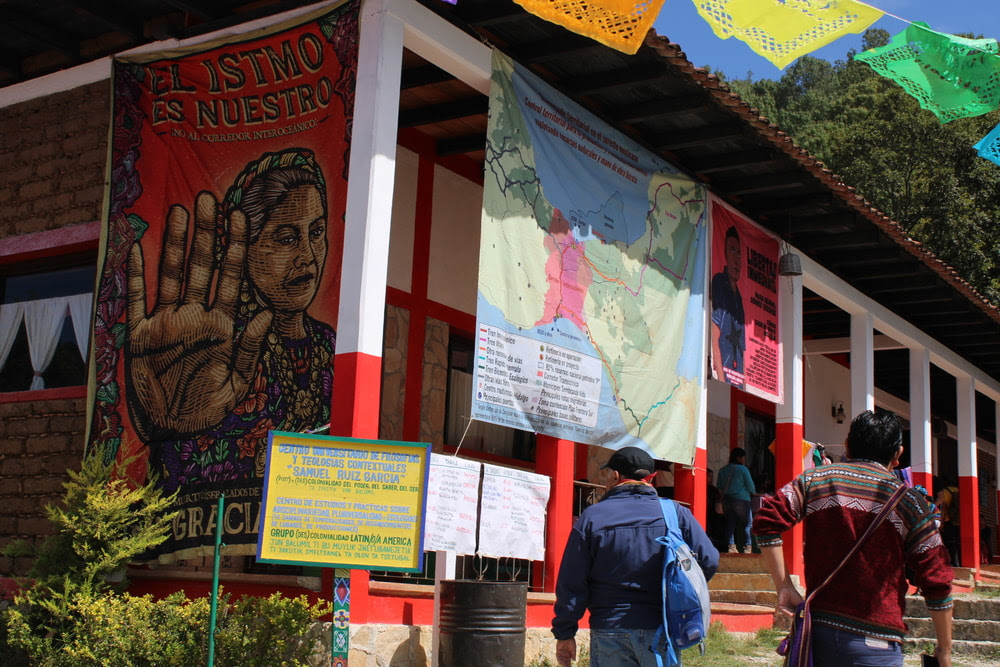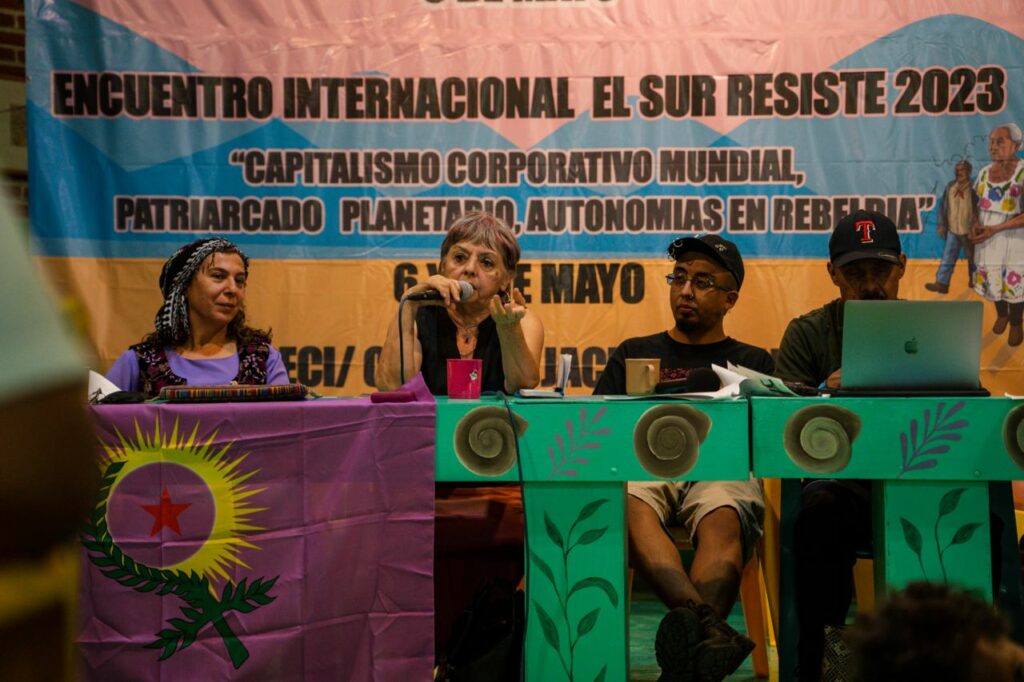Radio Zapatista
Listen to or download the audios here: https://radiozapatista.org/?p=44973
Nautical charts for tempestuous times. There is no doubt that the words shared at the International Meeting “Global corporate capitalism, planetary patriarchy, autonomies in rebellion”, which took place at the Caracol Jacinto Canek, in San Cristóbal de Las Casas, on May 6 and 7, are just that. These are some essential reflections that help us navigate the troubled times we live in.
For ten days, the Caravan of the South Resists toured the territories where the Transisthmian Corridor and the Mayan Train megaprojects are being built, visiting the communities affected by them, looking and listening carefully to understand what these projects really mean for the people and for the country. With this accumulation of pains and struggles, some 1,200 people gathered at the Jacinto Canek Caracol to think about what they had experienced and to bring it together with the reflections of other thinkers. For two days, a total of 940 people from the National Indigenous Congress belonging to 38 indigenous peoples; activists and thinkers from various parts of the country; and international visitors from El Salvador, United States, Germany, Spain, Argentina, Austria, Catalonia, Belgium, Puerto Rico, Colombia, Brazil, Canada, Cyprus, Bolivia, Costa Rica, Cuba, Ecuador, Euskal Herria, Italy, France, Finland, Switzerland, Greece, Honduras, Kurdistan, United Kingdom, Sweden, Guatemala, Uruguay, Venezuela and Wallmapu, gathered the many stories of dispossession and resistance in so many geographies to get a picture of the historical moment we are living.

In this first of two installments on the Encounter, we attempt to synthesize the analyses that were shared on the first day, in the voice of the Uruguayan thinker Raúl Zibechi; the Colombian activist Vilma Almendra, of the Nasa people in the Cauca region; the women of Kurdistan; the thinker Ana Esther Ceceña; and the lawyer Carlos González, of the National Indigenous Congress.
We also share the complete audios of the presentations, as well as the synthesis of what the Caravan discovered in its journey and, finally, the final pronouncement of the Caravan and the Encounter, which although read on the last day, we include it here because of its importance.
Global Context
To understand what is happening in Mexico, all the speakers agreed, it is necessary to understand the historical moment we are living in worldwide. We are going through, as has been said so many times, a moment of profound planetary crisis, hand in hand with a geopolitical rearrangement in which the United States and China are disputing world power. In this realignment, warned Raúl Zibechi and Ana Esther Ceceña, it is important not to be enchanted by the possible fall of the U.S. empire and applaud the emergence of China as a global power -a country that is undoubtedly capitalist and deeply patriarchal. These are, in fact, two different forms of capitalism; capitalism which, as Carlos Gonzalez explained, is going through a crisis never seen before due to the exponential growth of financial capital to the detriment of productive capital.
Although this dispute is taking place above all in the Indo-Pacific, southeast Mexico is no stranger to it, since Latin America is a strategic region for U.S. interests: military, on the one hand, but above all economic, since in the face of the supply crisis, intensified by the pandemic and even more by the war in Ukraine, the countries of the south provide the necessary replenishment. Today’s capitalism, Zibechi explained, depends on wars of dispossession to survive. According to rigorous analyses, 40% of the land in Latin America is still in the hands of peasants, indigenous and black communities, small producers, fishermen, harvesters, etc. And these lands are coveted by capital, which means that the war of dispossession we are witnessing has just begun and is of long duration.

There are two inescapable phenomena: militarization and the link between organized crime, the state and capital.
Militarization is here to stay, said Zibechi, but now with new characteristics. While in the past the left always opposed militarization, now progressive governments, such as those of Mexico, Argentina, Chile and Colombia, are promoting it much more successfully than the right has ever been able to do. The case of Mexico is of course the most extreme, and here we understand that militarism is not only used as a control mechanism for territorial reordering, but also as a source of capital accumulation, as the Army and the Navy are used to build and administer megaprojects in which large transnational corporations participate and which, as was observed throughout the caravan, do not benefit the people at all.
This militarization is not unrelated to the interests of the United States in its dispute for global power. On February 3 of last year, Mexico for the first time allowed the U.S. armed forces to conduct military exercises on national territory. This is part of the U.S. Southern Command’s new strategy for Latin America.
On the other hand, the alliance between the armed forces, the State, capital and organized crime, so evident in the testimonies gathered along the Caravan’s route and in those we heard at the working tables during the Encounter, is already a global systemic element. As Zibechi said, capital works in the style of the narco, and the narco is a highly successful capitalist enterprise.
Vilma Almendra detailed how in Colombia (as in Mexico), the narco is used to break movements, resistances and autonomies. Thus, the territory of Cauca, which until 2018 was controlled by the indigenous communities hand in hand with the community guard, is now under the control of armed groups, whose great engine is the narco. As in Mexico, in Colombia the narco is embedded at all levels of government. “We are governed by the best narcos,” said Almendra, “and they single us out as narcos and kill us.” In Mexico the crudest evidence of this is of course Genaro Garcia Luna, but as the many testimonies (and the experience of almost any citizen) demonstrate, the narco-state is more alive than ever in our country.

Beyond the military dimension, the mega-projects of the 4T are of great economic interest to the United States. Carlos González recalled that the wind projects have been stopped in the Isthmus of Tehuantepec, but he clarified that not in response to the claims of the affected peoples, but because the energy policy of the current government prioritizes gas and oil produced in South Texas. To the gas pipeline from Texas to Tuxpan, Veracruz, inaugurated in 2019, it is planned to add another stretch to connect it with the Transisthmian Corridor and with the Dos Bocas refinery in Tabasco.
On the other hand, the Corridor will function as a wall against migration, especially Central American migration. The border wall that Donald Trump announced would be paid for by Mexico is now being built not on the northern border, but on the Isthmus of Tehuantepec, to stop the huge flow of migration caused by the economic crisis as well as by militarization and the planetary environmental crisis.
Megaprojects of the 4T: a single project
Carlos González emphasized that the Mayan Train, the Inter-Oceanic Corridor, the Morelos Integral Project (for which Samir Flores Soberanes lost his life and which was finally stopped), the Santa Lucía airport, the gas pipelines and electric lines and all the rest of the planned infrastructure are not isolated projects, but components of a single project whose main objective is the territorial reorganization for the benefit of capital.

The Mayan Train envisions the construction of large hotels, an airport in Tulum, the modernization of the airports of Chetumal and Palenque, “developed cities” and industrial poles with investments of around one billion dollars each. The Inter-Oceanic Corridor, which connects with the Mayan Train, in addition to the train line from Coatzacoalcos to Salina Cruz, includes another from Coatzacoalcos to Palenque and a third from Ixtepec to Ciudad Hidalgo, on the border with Guatemala. This, as described by the Central American delegation at the end of the second day of the meeting, is articulated with megaprojects throughout Central America with the same purpose of territorial reordering for the benefit of capital. An oil and gas pipeline from Jaltipan to Salina Cruz, a deep fiber optic network and more than 15,000 hectares of industrial parks are also being reconstructed. All this with the participation of multinational companies such as Mota-Engil, Grupo Carso, Grupo Aspid, ICA, real estate companies such as Real Estate Market and Lifestyle, Grupo Industrial Hermes, Ferromás, Grupo México, FEMSA and more.
All these projects, most of which do not have serious environmental and social impact studies, invade people’s territories and destroy the social fabric. As Ana Esther Ceceña said, this is not only a physical plundering, but also a plundering of meanings, symbols and referents. In the construction process of these projects, archaeological pieces are looted and pre-Hispanic buildings are destroyed to make way for the train. In addition to the serious environmental damage, the felling of millions of trees and the destruction of the habitat of many animals, our history is being destroyed and profaned for the sake of a progress that serves only a few.
In the face of inevitable resistance, these projects are guarded not only by the armed forces, but by organized crime. As Carlos Gonzalez warned (and as is evident from the accounts of several organizations present at the meeting), it is the narco and paramilitary groups who provide protection to mining companies, agribusiness, gas pipelines and megaprojects, even participating with large profits in these businesses.
“To me, who have been working for so many years on the Nahua coast of Michoacán, with so many murdered and disappeared brothers and sisters, this 2023 reminds me a lot of Calderón’s 2011,” said González. And those who live in Chiapas have the privilege of knowing firsthand the rapid transformation of a beautiful state into a field of war.
Light in the darkness
“When the darkness is deep,” said Carlos González, “a light, no matter how small, is strong and powerful.”
The situation of forced displacement, repression, criminalization, assassinations and forced disappearances and all the horror that is lived in the territories that resist dispossession has its counterpart in the construction of life of the peoples.

In his journeys through the struggles of Latin America, Raúl Zibechi observes that there is an ongoing expansion of autonomies, to the point that for many peoples the autonomous path has become common sense, especially among indigenous peoples and the African diaspora. It is a path on which other forms of life and different social relations are being constructed. Vilma Almendra, for example, speaks of the process underway for the liberation of Cauca not only in terms of the recovery of farmland, but of a non-patriarchal, non-colonial and non-state relationship with the land. “Land to heal the heart and liberate ourselves with it.” The Kurdish resistance, as the Kurdish women rightly said, is a paradigm of hope for the world. “Democratic confederalism in Rojava creates life and proves that the nation-state is not the only solution.”
There is also underway a women’s insurgency not only for non-patriarchal and more just relations, but for rethinking our relationship to the land, to each other, and to life. It is not for nothing that the motto of the Kurdish revolution is “Woman, Life, Freedom”. Along with this, as was clear at the working groups, there is an active concern for the role of children and youth in the construction of other ways of living.
Finally, what became very clear in the meeting is that there is an awakening of the importance of spirituality as a foundation for the struggle and as a way to confront the brutality of dispossession. Because it is through spirituality that the land can be conceived not as a commodity, but as something sacred that must be cared for and respected. It is spirituality that nourishes art, that allows us to glimpse other possible worlds. It is spirituality that gives meaning to the construction of other ways of relating to each other and to nature. It is spirituality that nourishes us not to give up, to continue walking with heart, with “radical tenderness”, as it was expressed several times, with determination that destruction and death can only be faced by building life.
The great strength of struggle and life that we witnessed both in the caravan and in the meeting are small beacons that illuminate our navigation in the uncertain waters of our times.
Listen to or download the audios here:
https://radiozapatista.org/?p=44973
Original article at Radio Zapatista. English translation by Schools for Chiapas.
